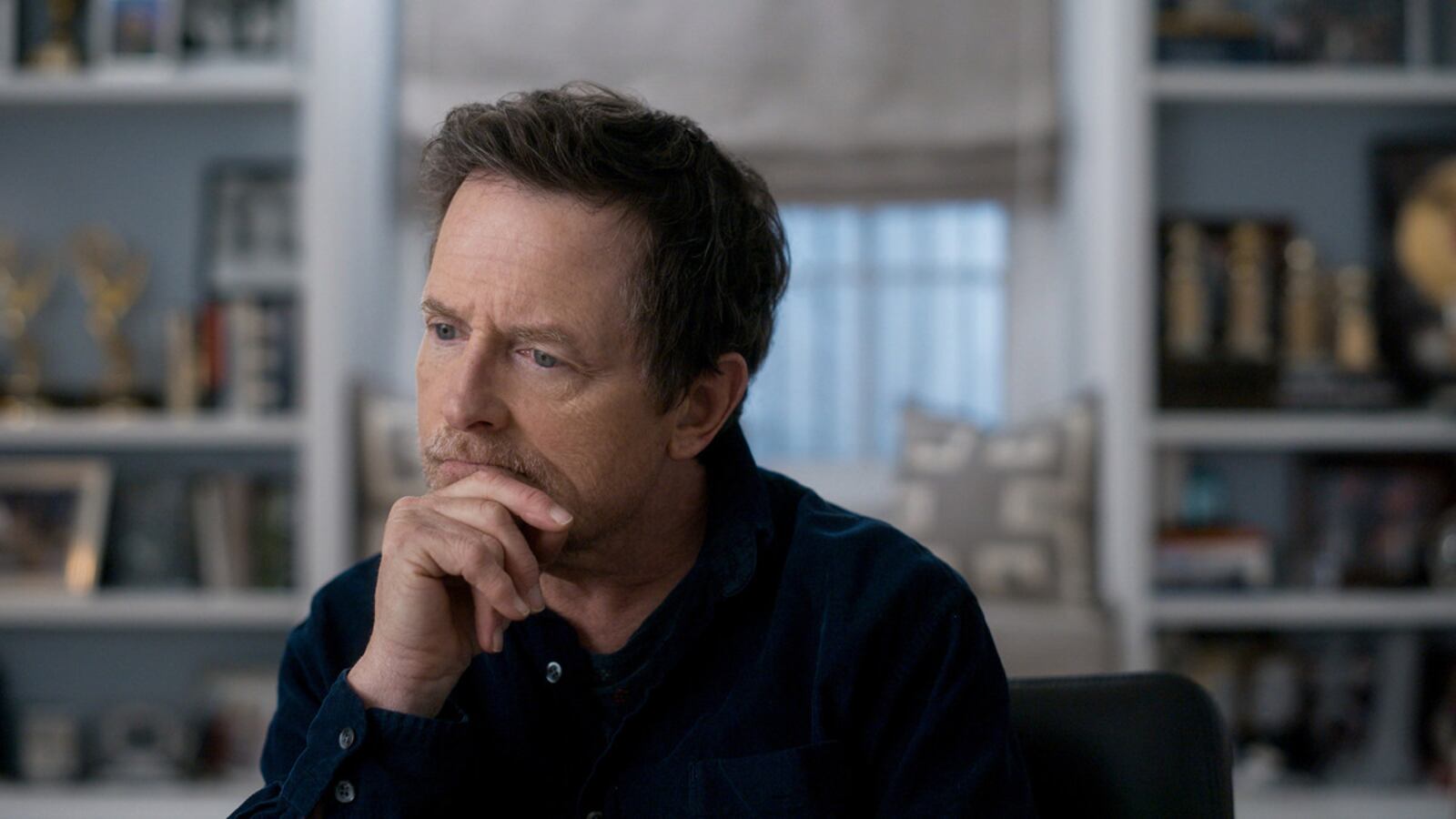For much of the 1980s and ’90s, Michael J. Fox was one of America’s favorite stars, which is why the news that he had Parkinson’s disease landed such a shocking blow. Still: A Michael J. Fox Movie is the endearing and affecting story of the beloved Family Ties and Back to the Future actor’s journey from Canada to Hollywood to the forefront of a fight against an incurable malady. Its poignancy and humor is amplified by its canny decision to let Fox tell his own tale.
An Inconvenient Truth director Davis Guggenheim places Fox front-and-center throughout Still: A Michael J. Fox Movie, with close-up interviews between filmmaker and star affording the former a chance to draw audiences near to his subject, and the latter an opportunity to candidly discuss his ups and downs while radiating the charisma that first made him a TV and movie sensation.
From the moment he arrived on NBC’s Family Ties, Fox was a whirlwind of witty charm. As a result, arguably the most touching component of Guggenheim’s documentary—premiering at this year’s Sundance Film Festival ahead of its forthcoming Apple TV+ debut—is the revelation that, despite wrestling with a condition that’s transformed the way he looks, acts and interacts with the world, he hasn’t let his ailment dim his irrepressible magnetism and winning sense of humor.
Sitting in a study, Fox describes the feeling of biding time until his Parkinson’s medication takes hold (he refers to it as “waiting for the bus”), details the numerous injuries that are an inevitable component of his day-to-day (and can’t be avoided simply by “being careful”), and the heroic commitment and love of his wife Tracy Pollan, whom he praises for assuming an onerous burden that wasn’t hers to shoulder.
In those instances, Fox is all the more admirable for tackling his obstacles head-on, his pragmatism as staunch as his comedic instincts are sharp. Even when pressed about why he doesn’t talk about his perpetual discomfort, he’s both forthright (“I am in pain!”) and yet unwilling to dwell on it, instead barreling forward with inspiring full-speed-ahead determination.
Motion is central to Still: A Michael J. Fox Movie, since as Fox himself admits, his on-screen presence was defined by—and his characters were shaped through—hasty, exuberant movement. Plentiful footage of Fox racing across the screen captures his youthful exuberance, just as scenes from his most famous projects (Family Ties, Back to the Future, The Secret of My Success) convey his megawatt appeal. Guggenheim’s documentary, however, reveals that Fox’s stardom was not always a sure thing.
Fox’s diminutive stature and boyish appearance proved to be an initial social curse (if an eventual professional advantage), and his adolescence was marked by bad grades and car crash-punctuated delinquency. He only found himself courtesy of his high school’s drama department, but even after convincing his father to relocate with him to Los Angeles, where he nabbed bit parts, Fox quickly found himself on the precipice of destitution.

Fox’s spotlight dreams were saved when a last-shot audition for Family Ties earned him laughs from creator Gary David Goldberg and, consequently, the part of Alex P. Keaton (whose middle initial he ad-libbed during the pilot). That led to an offer to replace Eric Stoltz in Robert Zemeckis’ Back to the Future, which immediately turned him into the next big thing, propelling him onto magazine covers and talk shows, and reconfiguring his reality into a hedonistic fantasyland.
In archival interview clips, he comes across as alternately cocky and self-effacing, as well as somewhat befuddled and amused by the sudden celebrity insanity in which he’s been caught up. Today, Fox remembers this period fondly, but admits that it was all an ephemeral “illusion” built out of “paper.”
Fox doesn’t shy away from his negative and destructive impulses, be it his workaholic ambition (driven, he claims, by deeply rooted fears and insecurities) or the ceaseless drinking that was his response to his Parkinson’s diagnosis and the stress of concealing his symptoms. Throughout, Guggenheim allows Fox to relay his own autobiographical odyssey via on-camera chats and narration (taken from his books).
Shrewder still, the director melds that material with dramatic recreations and a wealth of smartly chosen film and TV snippets that dovetail with certain stops along Fox’s path. Astutely and beautifully edited by Michael Harte, Still: A Michael J. Fox Movie creates fleet, harmonious parallels and echoes between the actor’s genuine and fictional experiences, and yet it refrains from underlining them as a way of making larger, heavy-handed one-to-one conclusions about life imitating art that might have tipped the proceedings into corniness.
What ultimately resonates most in Still: A Michael J. Fox Movie is Fox’s indefatigable spirit in the face of adversity. On a morning walk in Manhattan with his physical therapist, a passerby says hi, causing Fox to turn around and, in doing so, to take a nasty tumble. As the woman rushes back to check on him, Fox—without missing a beat—quips, “You knocked me off my feet!”
His candor is remarkable, whether he’s reminiscing about his painful efforts to hide his shaking left hand on the set of Spin City, recounting the disassociation and escape he craved from alcohol and distant movie sets, or the difficulty of grappling with a disease that restrains the facial, verbal and physical expressiveness that was key to his success. Simultaneously, his humor shines through Guggenheim’s portrait, seen in everything from his Curb Your Enthusiasm and The Late Show with David Letterman appearances to an off-the-cuff scene of his kids mocking him for his terrible texting habits.
“You’re only as sick as your secrets,” confesses Fox, and Still: A Michael J. Fox Movie is a biopic about the strength and resolve attained from facing the truth, no matter its ugliness or hopelessness. Sitting beside his son at the beach, Fox articulates the irony of finding calm and peace in his life only upon developing a condition that plagues him with constant shaking and trembling. Nonetheless, Guggenheim’s documentary is, in the end, a moving—and unfinished—portrait of a man, artist and crusader who refuses to sit still.
Keep obsessing! Sign up for the Daily Beast’s Obsessed newsletter and follow us on Facebook, Twitter, Instagram and TikTok.








